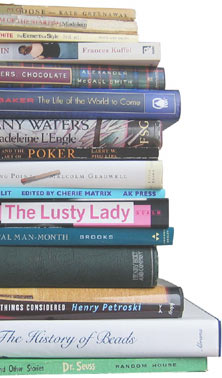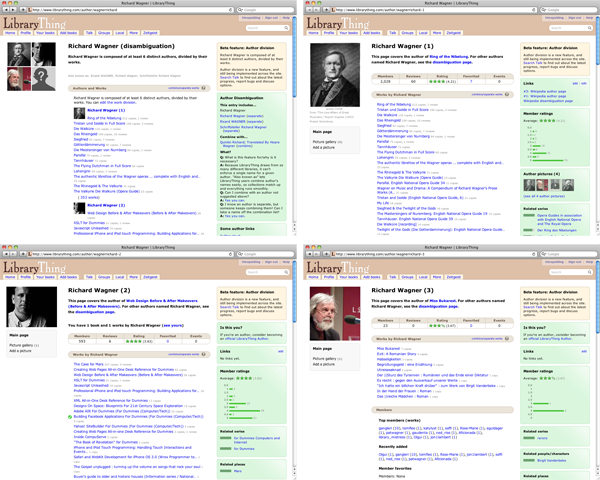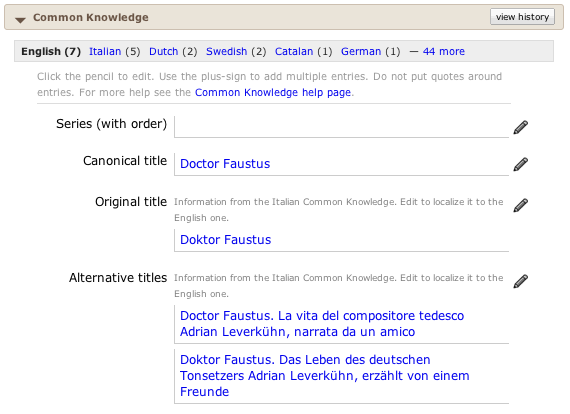 You may not know it, but LibraryThing is available in almost 50 languages, from Dutch and Catalan to Russian and Japanese–not to mention Pirate.
You may not know it, but LibraryThing is available in almost 50 languages, from Dutch and Catalan to Russian and Japanese–not to mention Pirate.
Member civitas points out that whatever language you’re on, the home page sports a pile of English books. As he put it, “The effect may be subtle, but why give a prospective new user something negative to think about, or to have a vague feeling about, before signing up …?”
We agree. So, a contest! Win a CueCat, or a LibraryThing t-shirt (plus everlasting fame and glory, of course).
What to do: Go to the list of language sites (there are 51 total) and choose which* to submit. We’ll also accept “Polyglot” submissions, to use as the default for any languages we don’t get entries for.
The photo:
- Should show a stack of books in that language (probably ~10 books or so is optimal).
- Light background
- We should be able to read the titles clearly
- Don’t include an e-reader (they look dated too fast)
Where to post it—do one of the following:
- Post to Flickr with the tag “LTInternationalBookpile” (also tag them “LibraryThing“). If you make a new account it can take a few days for your photos to be publicly accessible, so post a URL to them in the comments here.
- Upload the pictures to your LT profile (be sure to let me know they’re there by adding a comment to this post with your LT username).
- If all else fails, email your submissions to me (jeremy@librarything.com).
- Regardless of how you upload the images, please make sure to tell us what language you’re submitting for! LibraryThing employees are a linguistically talented lot** but labels will help.
All submissions must be received by Monday, 31 January at 6pm EST. Talk about ideas/submissions here.
What we’ll do: Once the entries are in, we’ll pick a winner for each language, and they’ll have their choice of a CueCat or a LibraryThing t-shirt (plus the aforementioned fame and glory). We’ll also pick an overall winner, who’ll win both a CueCat and a t-shirt, plus a membership upgrade or gift membership).
While you’re at it … This contests also offers us the perfect chance to remind people that translations for the various non-English sites are ongoing, and new contributors are always welcome! Anybody out there know Maori? Tim made the Maori translation in a fit of optimism during a talk in New Zealand. But it has yet to receive a single edit!
* You can submit bookpiles for more than one language. You can even win for more than one language. Tim’s standard fine print (“Our decision is final, incontestable, irreversible and completely dictatorial”) applies. Any questions or clarifications, just ask.
** Tim’s done Hittite, Abby Russian and Chris Catalfo is fluent in Italian.

 choose just one title from a list of all the books by that author (this step is useful in making sure we have the right one in case of split authors), and then we’ll confirm Author status.
choose just one title from a list of all the books by that author (this step is useful in making sure we have the right one in case of split authors), and then we’ll confirm Author status.



 You may not know it, but LibraryThing is available in almost 50 languages, from
You may not know it, but LibraryThing is available in almost 50 languages, from 







 Publishers do things country-by-country. This month we have publishers who can send books to the US, Canada, the UK, and many other countries. Make sure to check the flags by each book to see if it can be sent to your country.
Publishers do things country-by-country. This month we have publishers who can send books to the US, Canada, the UK, and many other countries. Make sure to check the flags by each book to see if it can be sent to your country.










































































